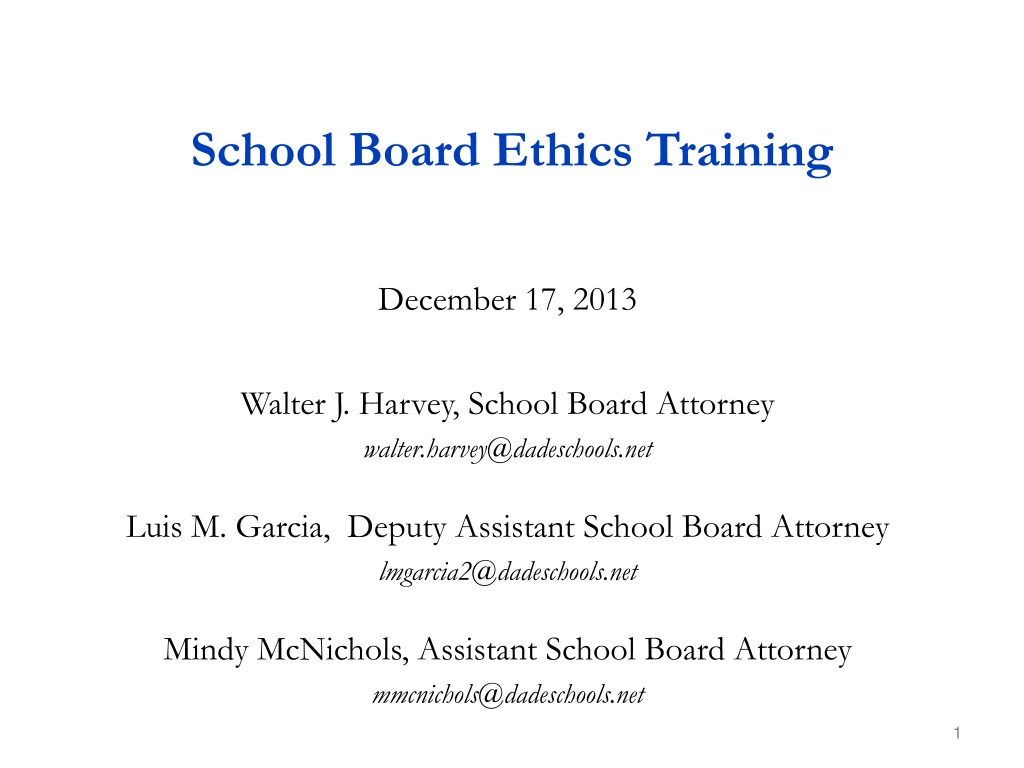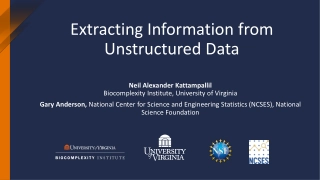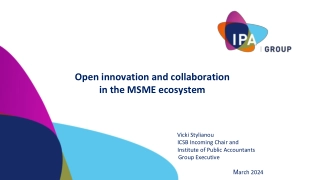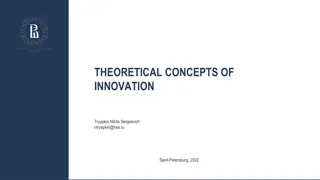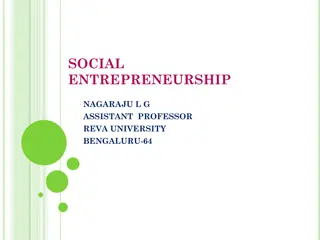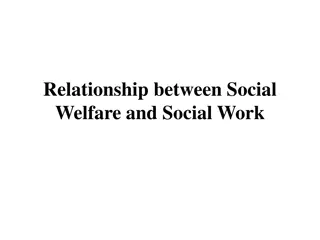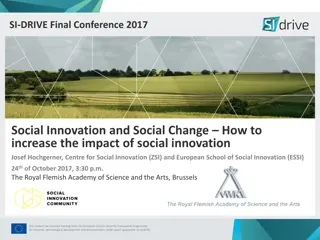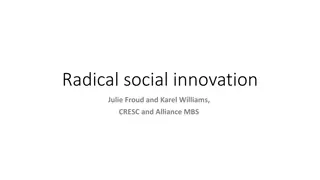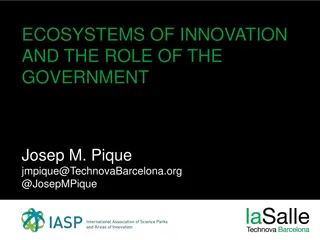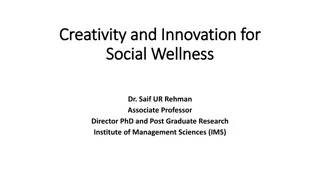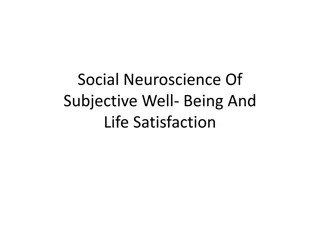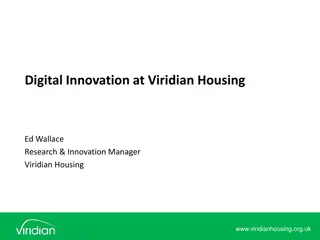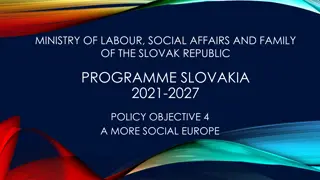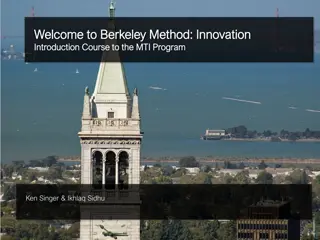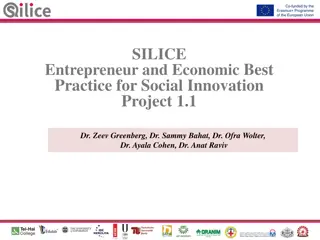Supporting Social Innovation for a Better World
In a time of challenges and societal shifts, social innovation emerges as a critical avenue for addressing pressing issues. Learn about the factors driving the need for social innovation in areas such as education and health, and the importance of radical innovation for creating impactful solutions. Discover the sources of radical innovation and the key role of social innovators in driving change. Join the movement towards a more innovative and sustainable world.
Uploaded on Feb 28, 2025 | 0 Views
Download Presentation

Please find below an Image/Link to download the presentation.
The content on the website is provided AS IS for your information and personal use only. It may not be sold, licensed, or shared on other websites without obtaining consent from the author.If you encounter any issues during the download, it is possible that the publisher has removed the file from their server.
You are allowed to download the files provided on this website for personal or commercial use, subject to the condition that they are used lawfully. All files are the property of their respective owners.
The content on the website is provided AS IS for your information and personal use only. It may not be sold, licensed, or shared on other websites without obtaining consent from the author.
E N D
Presentation Transcript
School Board Ethics Training December 17, 2013 Walter J. Harvey, School Board Attorney walter.harvey@dadeschools.net Luis M. Garcia, Deputy Assistant School Board Attorney lmgarcia2@dadeschools.net Mindy McNichols, Assistant School Board Attorney mmcnichols@dadeschools.net 1
Ethics Training Requirement Changes made to Florida ethics laws during 2013 legislative session require constitutional offices, including school board members and superintendents to take a minimum of four (4) hours of ethics training annually (Section 112.3142, F.S.). See also School Board Policy 0141.2, Conflict of Interest. Training must include: Article II, Section 8 of the Florida Constitution ( Ethics in Government ) Part III, Chapter 112, F.S. ( Code of Ethics for Public Officers and Employees ) Public Records Public meetings (Sunshine Law) 2
The Florida Ethics Commission (FEC) is authorized to make rules concerning the course content of the ethics portion of training. FEC Rule 34-7.025 states that the required training shall include one or more of the following: 1. Doing business with one s own agency; 2. Conflicting employment or contractual relationships; 3. Misuse of position; 4. Disclosure or use of certain information; 5. Gifts and honoraria, including solicitation and acceptance of gifts, and unauthorized compensation; 3
6. Post-office holding restrictions; 7. Restrictions on the employment of relatives; 8. Voting conflicts when the constitutional office is a member of a collegial body and votes in his or her official capacity; 9. Financial disclosure requirements, including the automatic fine and appeal process; 10. Commission procedures on ethics complaints and referrals; and 11. The importance of process for obtaining advisory opinions rendered by the Commission. 4
FEC also issued CEO 13-5 on September 18, 2013 providing the following guidance: any person with knowledge of the required subjects may provide the training training requirement may be satisfied by (1) completion of CLE or other continuing professional education class if the required subjects are covered; (2) prerecorded program or webinar, or (3) formalized study program involving review of written materials ultimate responsibility for compliance with the Code of Ethics is with the individual public officer or employee hourly requirement is not calculated minute for minute; fifty (50) minutes can satisfy one hour of the training requirement (like Florida Bar CLE) 5
annual training requirement refers to calendar year from January 1 December 31 of each year beginning 2013 The training does not have to be recently created but must contain updated information. 6
Article II, Section 8, Florida Constitution Ethics in Government A public office is a public trust. The people shall have the right to secure and sustain that trust against abuse. To assure that right: (a) All elected constitutional officers and candidates for such offices and, as may be determined by law, other public officers, candidates, and employees shall file full and public disclosure of their financial interests. (b) All elected public officers and candidates for such offices shall file full and public disclosure of their campaign finances. 7
(c) Any public officer or employee who breaches the public trust for private gain and any person or entity inducing such breach shall be liable to the state for all financial benefits obtained by such actions. The manner of recovery and additional damages may be provided by law. (d) Any public officer or employee who is convicted of a felony involving a breach of public trust shall be subject to forfeiture of rights and privileges under a public retirement system or pension plan in such manner as may be provided by law. 8
(e) No member of the legislature shall personally represent another person or entity for compensation during term of office before any state agency other than judicial tribunals. Similar restrictions on other public officers and employees may be established by law. (f) There shall be an independent commission to conduct investigations and make public reports on all complaints concerning breach of public trust by public officers or employees not within the jurisdiction of the judicial qualifications commission. (g) A code of ethics for all state employees and nonjudicial officers prohibiting conflict between public duty and private interests shall be prescribed by law. 9
(h) This section shall not be construed to limit disclosures and prohibitions which may be established by law to preserve the public trust and avoid conflicts between public duties and private interests. (i) Schedule--On the effective date of this amendment and until changed by law: (1) Full and public disclosure of financial interests shall mean filing with the secretary of state by July 1 of each year a sworn statement showing net worth and identifying each asset and liability in excess of $1,000 and its value together with one of the following: 10
a. A copy of the person's most recent federal income tax return; or b. A sworn statement which identifies each separate source and amount of income which exceeds $1,000. The forms for such source disclosure and the rules under which they are to be filed shall be prescribed by the independent commission established in subsection (f), and such rules shall include disclosure of secondary sources of income. (2) Persons holding statewide elective offices shall also file disclosure of their financial interests pursuant to subsection (i)(1). 11
(3) The independent commission provided for in subsection (f) shall mean the Florida Commission on Ethics. History.--Proposed by Initiative Petition filed with the Secretary of State July 29, 1976; adopted 1976; Ams. proposed by Constitution Revision Commission, Revision Nos. 8 and 13, 1998, filed with the Secretary of State May 5, 1998; adopted 1998. 12
Part III, Chapter 112, Florida Statutes Persons Governed by the Ethic Laws Public officers Public employees Local government attorneys Not Federal employees and officers Not Article V Florida judges and justices Not most independent contractors 13
Types of Ethics Laws/Standards Financial disclosure requirements Gift bans Gift disclosures Expenditure bans Voting/participation conflicts Anti-nepotism Various flat out prohibitions Agency/locality additional standards State/Federal criminal law 14
Anti-nepotism FS 112.3135 Bans certain hiring Bans certain advocacy Does not prohibit two relatives from merely working together; does not apply to a paramour Specifically exempts school districts, community colleges, and state universities. However, 1012.23(2) of the K-20 Education Code, prohibits a School Board member from employing or appointing a relative [ Relative, for purposes of this section only, with respect to a public official, means an individual who is related to the public official as father, mother, son, daughter, brother, sister, uncle, aunt, first cousin, nephew, niece, husband, wife, father-in-law, mother-in-law, son-in-law, daughter-in-law, brother-in-law, sister-in-law, stepfather, stepmother, stepson, stepdaughter, stepbrother, stepsister, half brother, or half sister. 112.3135, F.S.] 15
Doing Business With Ones Public Agency Prohibition FS 112.313(3); Has 2 Prohibitions: 1) From acting as a purchasing agent from purchasing from one s own business or that of a spouse or child; 2) From acting in a private capacity to rent, lease, or sell realty, goods or services to the person s agency Restricts rentals, leases, or sales between one s (or one s spouse s or child s) business and one s public agency or political subdivision Has exemptions, including exemptions listed in FS 112.313(12): grandfathers; advisory board members; emergency purchases (only to protect health, safety, and welfare); sole source; transactions of not more than $500) 16
Conflicting Employment and Contractual Relationships FS 112.313(7) Mirrors, but is broader than 112.313(3) No public officer or employee of an agency shall have or hold any employment or contractual relationship with any business entity or any agency which is subject to the regulation of, or is doing business with, an agency of which he or she is an officer or employee, excluding those organizations and their officers who, when acting in their official capacity, enter into or negotiate a collective bargaining contract with the state or any municipality, county, or other political subdivision of the state; nor shall an officer or employee of an agency have or hold any employment or contractual relationship that will create a continuing or frequently recurring conflict between his or her private interests and the performance of his or her public duties or that would impede the full and faithful discharge of his or her public duties. . . Exemptions in FS 112.313(12) Same as those listed for 112.313(3) Additional exemption in FS 112.313(15) [ For 501 (c) 3entities, but must abstain] 17
Employees Holding Office FS 112.313(10) prohibits public official from being an employee of the public entity he or she serves. Different than Florida Constitution dual office-holding restrictions [Simultaneously holding office with two different governmental entities] Article II, Section 5(a), Fla. Const. Example of violation is a school board member employed as public school teacher in same school district [However, he or she may be employed by the County or other agency] Example of situation that is not a violation is school board member employed as teacher in another county s school district But see FS 112.313(7)(a) creation of a conflict 18
Misuse of Public Position FS 112.313(6) No public officer, employee of an agency, or local government attorney shall corruptly use or attempt to use his or her official position or any property or resource which may be within his or her trust, or perform his or her official duties, to secure a special privilege, benefit, or exemption for himself, herself, or others. Examples: Influencing hiring decisions; fixing a traffic ticket; etc. Depends on the facts and circumstances of each case Most difficult to prosecute Encompasses bad/evil conduct Not triggered by policy decisions alone Requires corruption 19
Use of Inside Information FS 112.313(8) Can encompass ultimately public information (i.e., the information may or will later become public knowledge). A current or former public officer, employee of an agency, or local government attorney may not disclose or use information not available to members of the general public and gained by reason of his or her official position, except for information relating exclusively to governmental practices, for his or her personal gain or benefit or for the personal gain or benefit of any other person or business entity. Sometimes an issue in collective bargaining matters. 20
Solicitation/Acceptance of Certain Gifts FS 112.313(2): No public officer, employee of an agency, local government attorney, or candidate for nomination or election shall solicit or accept anything of value to the recipient, including a gift, loan, reward, promise of future employment, favor, or service, based upon any understanding that the vote, official action, or judgment of the public officer, employee, local government attorney, or candidate would be influenced thereby. Things of Value: Gifts, loans, rewards, promises of future employment Amounts to bribery (quid-pro-quo) A rare occurrence and even rarer to prove, but is the most newsworthy 21
Unauthorized Compensation/Gifts FS 112.313(4): attorney or his or her spouse or minor child shall, at any time, accept any compensation, payment, or thing of value when such public officer, employee, or local government attorney knows, or, with the exercise of reasonable care, should know, that it was given to influence a vote or other action in which the officer, employee, or local government attorney was expected to participate in his or her official capacity. No public officer, employee of an agency, or local government Is based on actual or constructive knowledge A more useful tool than FS 112.313(2) Somewhat displaced by FS 112.3148 and the $50 K-20 Education Code provision, FS 1001.421* [Authority of COE to implement is questionable] 22
Gift Prohibitions and Disclosures for R.I.P.E.s FS 112.3148: any gift from a vendor doing business with the reporting individual s or procurement employee s agency,. . . or a lobbyist who lobbies the reporting individual s or procurement employee s agency, or the partner, firm, employer, or principal of such lobbyist, where such gift is for the personal benefit of the reporting individual or procurement employee, another reporting individual or procurement employee, or any member of the immediate family of a reporting individual or procurement employee. A reporting individual or procurement employee is prohibited from soliciting Applies to reporting individuals at the state and local level, and to procurement employees at the state level Prohibits gifts from lobbyists and their cohorts valued at more than $100 Requires reporting of certain gifts Prohibits solicitation of any lobbyist gift See also K-20 Education Code $50 provision 23
Reporting Requirement Quarterly Gift Disclosure Annual Gift Disclosure No later than July 1 of each year, each reporting individual or procurement employee shall file a statement listing each gift having a value in excess of $100 received by the reporting individual or procurement employee, either directly or indirectly, from a governmental entity or a direct-support organization specifically authorized by law to support a governmental entity. The statement shall list the name of the person providing the gift, a description of the gift, the date or dates on which the gift was given, and the value of the total gifts given during the calendar year for which the report is made. 112.3148(6) 24
Honoraria and Honorarium Event-Related Expenses FS 112.3149: A payment of money or anything of value, directly or indirectly, to a reporting individual or procurement employee, or to any other person on his or her behalf, as consideration for: 1. A speech, address, oration, or other oral presentation by the reporting individual or procurement employee, regardless of whether presented in person, recorded, or broadcast over the media. 2. A writing by the reporting individual or procurement employee, other than a book, which has been or is intended to be published. An employee will not solicit or accept an honorarium, which is related to the employee s job duties. "Honorarium" shall be defined consistent with F.S. 112.3149, as a payment of money or anything of value paid to the employee or on his/her behalf as consideration for an oral presentation or writing other than a book. School Board Policy 1201.01, Code of Ethics. School Board Policy 0141.2(3): No Board member may solicit an honorarium related to the member's public office or duties. No Board member may knowingly accept an honorarium from a political committee or committee of continuous existence, or from a lobbyist who lobbies the Board (or from the employer, principal, partner, or firm of the lobbyist). Actual and reasonable transportation, lodging, and food and beverage expenses related to the honorarium event for a Board member and spouse may be accepted. 25
Revolving Door/Post Office Holding Restrictions S 112.313(14) local government level Lasts for two years after leaving public position At state level, prohibits representation before all of one s former agency At local level, as to former school board members, prohibits representation before any part of the school district Requires personal representation for compensation is not vicarious to other members of one s private firm Subject to limited grandfathering 26
Voting Conflicts Law FS 112.3143 Applies at state and local levels No county, municipal, or other local public officer shall vote in an official capacity upon any measure which would inure to his or her special private gain or loss; which he or she knows would inure to the special private gain or loss of any principal by whom he or she is retained or to the parent organization or subsidiary of a corporate principal by which he or she is retained, other than an agency as defined in s. 112.312(2); or which he or she knows would inure to the special private gain or loss of a relative or business associate of the public officer. . . 112.3143(3(a), F.S. Applies to members of government collegial bodies, including advisory bodies [School District Advisory Committees, EESACs] Requires oral declaration, abstention from voting, and written disclosure via CE Form 8B at local level: . . . Such public officer shall, prior to the vote being taken, publicly state to the assembly the nature of the officer s interest in the matter from which he or she is abstaining from voting and, within 15 days after the vote occurs, disclose the nature of his or her interest as a public record in a memorandum filed with the person responsible for recording the minutes of the meeting, who shall incorporate the memorandum in the minutes. 112.3143(3(a) Triggered by special private gain OR loss to the member personally or to certain others 27
Financial Disclosure (CE Form 6) Filed by Constitutional officers and certain others Called full disclosure Requires lots of detail Is a goldmine for the press Not filed by many state employees or local government employees Also, see CE Form 6F and CE Form 6X 28
Financial Disclosure (CE Form 1) Called limited disclosure Is the form most often filed by public employees who file financial disclosure Has percentage threshold versus dollar amount choices/options Due within 30 days of hiring Due on or before each July 1 thereafter CE Form 1F is due within 60 days of leaving one s public position Also, see CE Form 1X 29
Disclosure of Specified Business Interests FS 112.3145(5) Required of Form 6 and Form 1 filers Concerns disclosure of businesses granted a privilege to operate in this state Forms 6 and 1 contain a finite list of such businesses 30
Client Disclosure (Quarterly) FS 112.3145(4) Applies to Form 6 and Form 1 filers CE Form 2 Applies to representations by a public officer/employee and to those by members of his or her private firm Has certain exceptions 31
More Stringent Ethics Standards Are not preempted by the Code of Ethics or the Commission on Ethics FS 112.326 May be problematic May be subject to vested rights, union contract rights, or other restrictions May be good in particular situations Do not waive floor of state ethics laws Should be based in reason and logic 32
Florida Commission on Ethics Nine members (appointed) Meets approximately every six weeks Administers Article II, Section 8, Florida Constitution, and Part III, Chapter 112, Florida Statutes Handles ethics complaints, issues advisory opinions, and administers financial disclosure laws Florida Commission on Ethics P.O. Drawer 15709 Tallahassee, Florida 32317-5709 (850) 488-7864, telephone (850) 488-3077, facsimile www.ethics.state.fl.us 33
Public Records Chapter 119, Florida Statutes Provides right of access to government records and those of private entities acting on behalf of government. The right is also recognized in Article I, Section 24, Florida Constitution: Access to public records and meetings. (a) Every person has the right to inspect or copy any public record made or received in connection with the official business of any public body, officer, or employee of the state, or person acting on their behalf, except with respect to record exempted pursuant to this section or specifically made confidential by this Constitution. This section specifically includes the legislative, executive and judicial branches of government and each agency or department created thereunder; counties, municipalities, and districts; and each constitutional officer, board, and commission, or entity created pursuant to law or this Constitution. (b) All meetings of any collegial public body of the executive branch of state government or any collegial public body of a county, municipality, school district, or special district, at which official acts are to be taken or at which public business of such body is to be transacted or discussed, shall be open and notice to the public and meetings of the legislature shall be open and noticed as provided in Article III, Section 4(d), except with respect to meetings exempted pursuant to this section or specifically closed by this Constitution. 34
A public record open to inspection and copying includes: All documents, papers, letters, maps, books, tapes, photographs, films, sound recordings, data processing software, or other material, regardless of the physical form, characteristics, or means of transmission, made or received pursuant to law or ordinance in connection with the transaction of official business by any agency. 119.011 (1), F.S. (emphasis added) Encompasses all materials made or received in connection with official business that are used to perpetrate, communicate or formalize knowledge. 35
Public Records Chapter 119, Florida Statutes Any documents produced by or for the School Board and any documents received by the Board or individual Board members, or employees. Any personal information, except for your social security number, such as your home address, work or personal e-mail address, becomes public record subject to disclosure upon request. All electronic communications, including e-mail and text messages, are public records which must be available for public inspection and must be retained if used to perpetuate, communicate or formalize knowledge in connection with the business of the board. Similarly, all electronic calendars, databases and word processing files stored on agency computers can constitute public records subject to disclosure. However, spoken or bulk mail do not necessarily constitute a public record. Drafts or preliminary documents are public records subject to disclosure unless specifically exempted. 36
Handwritten notes by individual members regarding official business of the Board and/or used at a meeting in discussing the member s position on an issue could be deemed public records. Handwritten notes are probably not public records if they are intended only to jog the board member s memory, are for personal use and/or are precursors to a future document. Key test is whether material was made or received in connection with transaction of official business. For example, an email sent by an elected official from personal account using personal computer and blind copied to friends and supporters did not constitute a public record (Butler v. City of Hallandale Beach, 68 So.3d 278 (Fla. 4th DCA 2011)) Determining factor is the nature of the record, not its physical location (City of Clearwater, 863 So.2d 149 (Fla. 2003)) (personal email between government employees on government-owned computers not public records). Public Records Act applies to advisory boards. 37
May apply to a private corporation or entity that provides services or receives funds from governmental body term agency includes private entities acting on behalf of any public agency (Section 119.011(2), F.S.) Totality of factors test Delegation test Agencies payment of dues from public funds to private entity subjects private entity s financial, business and membership records pertaining to public agency to disclosure as public records. Judiciary not an agency subject to Public Records Act but Article I, Section 24 of Constitution does provide right of access except to confidential records determined by rules. Public Records Act also does not apply to the legislature but there is constitutional right of access in Article I, Section 24(a) which applies to all public bodies; legislature may provide for exemptions by law. Each chamber is authorized to adopt rules relating to records. Generally, Department of Children & Families are confidential and exempt. 38
Charter Schools are subject to Public Records Act and Sunshine law pursuant to Section 1002.33(16)(b), F.S. Testing materials are generally exempt. (S. 1008.23, F.S.) Emergency, security plans are exempt. (Section 119.071(3), F.S.) Investigative records made or received by public agencies are open to public inspection usually after the investigation is completed or when probable cause is found. Student records that contain a student s personally identifiable information, e.g., name, address, social security number, student I.D. number, etc., are strictly confidential and are not public records Public school system employees: Complaint and investigative material are confidential until preliminary investigation is concluded or ceases to be active (1012.31 (3)(a), F.S.); anonymous materials cannot be destroyed; personnel files open at all times to (AGO) 87-48) Superintendent, School Board members, principal and designees (1012.31(3)(b),(c), F.S.) Evaluations are confidential for one (1) year until end of school year immediately following school year in which evaluation was made (1012.31(3)(a)(2), F.S.) 39
AGENCY RESPONSES TO PUBLIC RECORDS REQUEST Social Security numbers exempt (119.071(5)(a)5, F.S.) Health information exempt. Public agencies may impose reasonableconditions to public records request Must respond to requests within a reasonable time Attorneys fees and costs can be imposed for failure to permit access Records must be maintained according to schedules adopted by the State Division of Library and Information Services (119.021(2)(a), F.S.) Potential Sanctions for Violation: Violators are subject to civil penalties. Knowing or willful violations may lead to removal and/or a first degree misdemeanor punishable by up to one year in prison and fines. 40
Public Meeting, Sunshine Law Chapter 286, Florida Statutes Basic Principles: All meetings where official action is taken must be publicly noticed and open to the public. Also required under Article I, Section 24, Florida Constitution except for judiciary and legislature (which has its own provision requiring access). Officialaction includes any vote, resolution, rule, formal action or discussion. Organizational meetings, briefing sessions, workshops, informal meetings and all other committee meetings in which two or more Board members are present, no matter what they are called, are subject to the Sunshine Law. Applies to elected and appointed advisory committees and boards even where the recommendations are not binding. 41
Directsupport organizations are subject to Sunshine Law. Also applies to advisory committees appointed by a single public official. Disciplinary proceedings are subject to Sunshine Law Quasi-Judicial are not private Fact-finding or information-gathering advisory committees are exempt. This exemption does not apply to a board with ultimate decision-making authority. In Finch v. Seminole County School Board, 995 So.2d 1068 (Fla. 5th DCA 2008), exemption did not apply to school board taking fact-finding bus tour. Meeting must be publicly noticed and posted. Votes must be recorded or counted for each member present at a meeting. Voting can be by roll call, voice vote ( ayes or nays ), and written ballot as long as the ballots are made available to the public. Secret votes are not permitted. Members can abstain from voting only because of declared legal conflict of interest. Written minutes of the meeting must be taken even if the meeting is recorded. Both the written minutes and the audio or video tape (if recorded) must be made available for public inspection. 42
Meetings must be held in a location and facility that is reasonably accessible to the public and does not discriminate based on gender, gender identity or expression, age, race, color, national or ethnic origin, religion, political beliefs, marital status, sexual orientation, social and family background, linguistic preference, disability or economic status. No two or more members may meet to discuss any matter on which foreseeable action will be taken by the Board without meeting the requirements of the Sunshine Law. Even at publicly noticed community meetings and regular committee meetings, members may not have private discussions about any matter that may come before the committee. 43
The Sunshine Law applies not just to in-person meetings but to telephone conversations, e-mail and social networking communications. Members may not use staff to relay communications to other members about matters that may come before the committee. 44
Exemptions: Attorney-Client Meeting (Section 286.011(8), F.S.) May meet in private with attorney to discuss pending litigation to which the entity is presently a party before a court or an administrative agency providedthat : a) Attorney must advise the entity in a public meeting b) Subject matter of meeting is confined to settlement negotiations or strategy sessions related to litigation expenditures c) Meeting must be recorded by court reporter no portion can be off the record; must be transcribed and provided to Clerk d) Meeting must be publicly noticed as to time, date and persons attending e) Transcript made part of public record upon conclusion of the litigation 45
Purpose is for attorney to receive direction from governmental body No final decision on litigation matters can be voted on; final settlement must be voted in a public meeting Cannot convene private attorney-client session for threatened litigation (AGO 04-35, 98-21, 06-03, 9-14) Risk Management May have private meetings relating solely to evaluation of claims or offers of compromise filed with risk management, for tort claims only that entity could be liable for under 768.28, F.S. Records becomes public when litigation is terminated and all claims related to incident are settled. 46
Collective Bargaining Collective Bargaining negotiations with other side are not exempt, but Superintendent may meet with School Board to discuss actual or impending collective bargaining Does not have to be advertised in advance Matters discussed are not subject to public disclosure. (AGO 03-09) Disciplinary proceedings are subject to Sunshine Law Quasi-judicial proceedings are not private 47
Potential Criminal Sanctions for Violation: Violation may include criminal penalties against the violators and may cause the committee action to be set aside. 48
